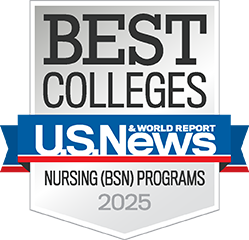Leading HIV prevention
DNP program alumna advocates for at-risk populations

Bethsheba Johnson’s unconventional career demonstrates the value of nurses throughout the health care industry. Through lifelong learning and a passion for focusing on patients, she progressed from an operating room technician in the U.S. Army to lead a seven-member team at Gilead Sciences.
Johnson earned her Doctor of Nursing Practice (DNP) degree from Cizik School of Nursing at UTHealth in the summer of 2020. In addition to earning her BSN at Chicago State University, she completed her MSN, post-master’s gerontological nurse practitioner certification, and predoctoral fellowship in immunology at Rush University in Chicago before continuing her education in Houston.
“Bethsheba is a fantastic role model for nursing and a real mover and shaker in the field of HIV prevention,” said Assistant Professor Nancy Crider, DrPH, RN. “She is a well-known and respected expert in Houston. As her faculty advisor and colleague, I am very proud of her accomplishments.”
Just weeks after earning her DNP, Johnson was promoted to Senior Field Director for Gilead’s HIV Prevention Team-West, where a physician, three doctors of pharmacy, and three nurse practitioners work to reach at-risk populations from Texas to Hawaii. She joined the biopharmaceutical company in 2012 as a senior medical scientist.
“I took the leadership track, and now I am officially a leader as well as an influencer,” said Johnson, DNP, APRN, GNP-BC. “I would not be able to do that if I had not gone through the DNP program. Cizik School of Nursing provided the added background I needed.”
One highlight of Johnson’s program was a mock Senate meeting, through which students hone their skills at making policy presentations. While she was no stranger to providing such testimony, the class boosted her skills and confidence when Rep. Sheila Jackson Lee, D-Houston, invited her to Washington to speak at a U.S. Senate hearing on implementing HIV pre-exposure prophylaxis (PrEP) for Black women.
“PrEP is used primarily by white gay men, but most of the new incidents of HIV in the South and Texas are in Black people,” Johnson explained. “Women of color have a low perception of risk, so health care providers have to get used to asking those very personal questions.”
Her testimony exemplifies two critical aspects of Johnson’s career – nursing and diversity, equity, and inclusion (DEI) efforts. She is involved with various DEI groups at Gilead, including a women’s group that submitted comments to the U.S. Food and Drug Administration’s Office of Women’s Health Strategic Priorities about the need to make clinical trials more accommodating to women.
Johnson became one of the first steering committee members of Gilead’s Medical Affairs Inclusion Network, which hosted listening sessions to help employees of all races and backgrounds process police-involved deaths of Black people and other recent racial injustice occurrences. She also visits historically Black and Latino universities as part of Gilead’s recruiting efforts to build a more diverse workforce.
“Diversity comes from different experiences and mindsets,” said Johnson, adding that nurses’ perspectives are essential in what many would consider nontraditional roles, like her position at Gilead. She encourages more nurses to seek doctoral-level degrees to prepare themselves for leadership in health care. “We are the most trusted profession in all of health care. We need people dedicated to the care of the patient and to utilizing the patient’s voice.”
Sherri Deatherage Green


